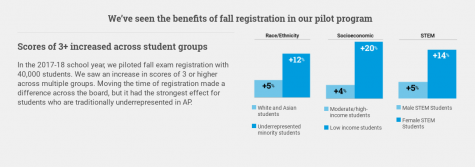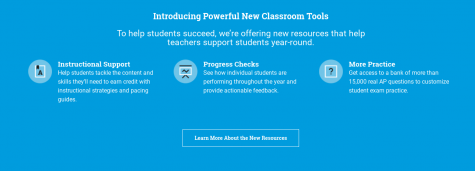Changes to AP Program Elicit Mixed Reactions from Students and Teachers
Chamblee Charter High, the home of 32 AP courses.
November 8, 2019
Advanced Placement (AP) courses—they are a way to earn college credit while still in high school and also offer a slight boost to one’s weighted GPA. Every year, students are given the option to either take or opt-out of taking the end-of-year AP exam for each of their AP courses, which determines whether or not students are eligible for college credit.
However, College Board, the organization in charge of the Advanced Placement Program, has recently decided to move the deadline for AP exam sign-ups up from February to November 15 (payments for Chamblee students, however, are due by November 4), starting this school year. The controversial decision has stirred discussion among students and teachers alike, with some viewing the decision as a step in the right direction and others just the opposite.
The decision for change impacts Chamblee students especially, as Chamblee offers 32 AP courses, the most AP courses out of any DeKalb County high school, and has also been recognized as an Advanced Placement honor school multiple times. To be recognized as an AP honor school, a certain percentage of students in the school must take and perform well on the exams, among other qualifiers.

According to College Board’s official website, the test sign-up deadline was moved because “commitment translates into more students taking the exam and earning college credit.” The organization administered the new changes as a test on a smaller sample size prior to this school year and noticed that it yielded more positive test results.
“In the 2017–18 school year, we piloted fall exam registration with 40,000 students,” the website states. “We saw an increase in scores of three or higher across multiple groups. Moving the time of registration made a difference across the board, but it had the strongest effect for students who are traditionally underrepresented in AP.”
Regardless, some teachers and students view the change as a bad move, as it forces students to make a decision on whether or not they are taking the exam before they can gauge their preparedness and knowledge of the course material.
“I hate [the change]. It’s actually really bad because you don’t get as much time to contemplate and get a feel of the class,” said junior Belane Abdurahman. “When it’s at the end of the year, you can decide whether or not you feel confident [about] the subject and your knowledge of it; but it being this early in the school year, you really don’t know how well you think you’re gonna perform.”
Sophomore Raisa Ahmed, while not personally affected by the new changes, likewise sees how it can be troublesome for her peers.
“[Personally], if I sign up for an AP class, it’s because I want to take the exam so I’m already inclined to take the exam,” said Ahmed. “[But] I think it’s very inconvenient, not for me but for others, because you really don’t know if you want to take the test because it’s only the beginning of the year.”
Similarly, AP Psychology teacher Kurt Koeplin sees the new changes as potentially detrimental to the AP program and believes that there will be a significant drop in students taking the exam as a result.
“It’s the first year that College Board has rolled this program out where they’re trying to get everybody signed up early in the first semester, and so I think there’s gonna be a portion of kids, and probably a pretty healthy portion […] that aren’t going to take it because they didn’t get their payments in on time,” said Koeplin.
Koeplin also feels that the change will strip students of the chance to earn a potential college credit.
“Obviously you don’t wanna incur that late penalty, so I think [students who didn’t get their payments in on time] are just gonna forgo it, and that’s a shame because not only does it mean they’re gonna miss that opportunity to get a college credit […], but also it’s gonna make our AP test numbers go down and our school is much more than that,” said Koeplin. “We’re very active in the AP program, and College Board knows this, so I’m assuming they’re gonna see this drop countrywide, not just here.“
On the other hand, AP Biology teacher DeAnne Peterson believes that College Board will see an increase in exam sign-ups with the new arrangement.
“I think that with the early sign-ups, I have more students that are willing to take the test. At this point, they haven’t gotten to a point where they feel overwhelmed with the course work or the rigor of the course,” said Peterson.
However, while she agrees that an earlier deadline could increase student performance on AP exams, Peterson does think that College Board may have possibly made the decision with financial benefits in mind.
“You know, College Board is making money also, and the more students that take the test then the more money College Board makes, but I agree a little bit with their assessment that if you sign up early, then you know that you’ve paid for it and then you’re more likely to focus your way through the whole course until spring,” she said.
AP US History teacher Jennifer Tinnell also shares this sentiment.
“I agree that if you know that you’re committed to taking the test, you are more likely to put more effort into it,” said Tinnell. “I know that you have to feel confident about wanting to take the test.”
Additionally, Tinnell emphasized that teachers play a significant role in persuading and assuring students that they will be prepared to take the course’s exam come May, which can be a difficult task with the earlier deadline.
“One of my jobs is to make sure you feel good about the material and how I’m teaching you, so I am a little hesitant and concerned about that early sign-up and that commitment,” she said. “but hopefully having me as your teacher and knowing how my former students have done is convincing enough that you sign up in November versus in February.”
In addition to moving up the registration deadline for AP exams, College Board also rolled out a new platform on their website that allows teachers to assign students official practice AP exam questions curated by College Board themselves. Teachers have been recommended to use the new platform, called AP Classroom, to help prepare their students for the exam in May and get them accustomed to AP-style questions.

“I kinda like it,” said Abdurahman, referring to the new tool. “It gives us a good idea of what we can expect on the actual exam. It also gives explanations as to why you may have gotten a question wrong or why you got it right if you guessed, so it’s helpful.”
Some students also found AP Classroom to be helpful in not just exam preparation, but also in reviewing concepts previously learned in class.
“My stat teacher has assigned me AP classroom assignments, and I think it’s a good practice. It helps you review the units you just learned [in class],” said Ahmed.
Unlike the much more controversial deadline change decision, the new platform has generally been regarded as useful and has received mostly positive reception from students and teachers alike. And in any case, use of the new platform is not required if the teacher does not see it necessary.
“I like it because I like a bunch of the questions, I like how I can see what the students were thinking, what they’re missing, and I like how I can see what they’re writing in for free responses,” said Peterson.
However, that isn’t to say that the new website is without its flaws.
“It’s a little bit of a clunky interface,” said Peterson. “I’ll look and [an assignment] is unlocked on one screen and then it’s not unlocked on a different screen, so they need to upgrade their software a little bit. But so far I like it.”
Some teachers are holding back from using AP Classroom for the time being due to various reasons, from ensuring that students are not overloaded with work to having to get more acquainted with the tool beforehand.
“I just honestly need to get a little more familiar with it,” said Koeplin. “I know that Ms. Fraser is using it pretty effectively right now, so hopefully after seeing what she’s doing in it and as she makes that more visible to everybody else that teaches AP, I think I’ll probably use it more, and I think you’ll see other teachers using it more.”
Tinnell, on the other hand, feels that her students already have enough work on their hands and wants to refrain from giving an excessive workload.
“I have done a few assignments, but not for grades. […] I already have so much that I need my students to do, though, that has been successful in the past. I’m not opposed to change, but I don’t want to overload my students with more. If I’m going to use more of the AP classroom, I’m going to have to pull back on something else,” said Tinnell.
All this being said, there is no telling whether or not College Board will stick with these new changes to the AP Program or if they have future plans for further improvement. Only time (and test scores) can tell.












Wheres the money • Nov 9, 2019 at 9:53 am
Great article on the perspective of teachers and students. As a parent, it really ticked me off this year to have Chamblee charge a $4 convenience fee per test. Given all the money I pay in taxes, it was simply a slap in the face. Then I visited the College Board website to find that schools already get a kickback for each test – they receive $9 per exam: https://apcentral.collegeboard.org/ap-coordinators/exam-ordering-fees/exam-fees
I would love to know what Chamblee’s doing with this $13 per exam. That’s a lot of money for “administrative” purposes, especially considering the high number of AP courses (and therefore dollars) that Chamblee is getting.